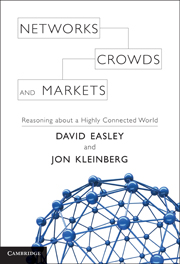Book contents
- Frontmatter
- Contents
- Preface
- 1 Overview
- Part I Graph Theory and Social Networks
- 2 Graphs
- 3 Strong and Weak Ties
- 4 Networks in Their Surrounding Contexts
- 5 Positive and Negative Relationships
- Part II Game Theory
- Part III Markets and Strategic Interaction in Networks
- Part IV Information Networks and the World Wide Web
- Part V Network Dynamics: Population Models
- Part VI Network Dynamics: Structural Models
- Part VII Institutions and Aggregate Behavior
- Bibliography
- Index
3 - Strong and Weak Ties
from Part I - Graph Theory and Social Networks
Published online by Cambridge University Press: 05 June 2012
- Frontmatter
- Contents
- Preface
- 1 Overview
- Part I Graph Theory and Social Networks
- 2 Graphs
- 3 Strong and Weak Ties
- 4 Networks in Their Surrounding Contexts
- 5 Positive and Negative Relationships
- Part II Game Theory
- Part III Markets and Strategic Interaction in Networks
- Part IV Information Networks and the World Wide Web
- Part V Network Dynamics: Population Models
- Part VI Network Dynamics: Structural Models
- Part VII Institutions and Aggregate Behavior
- Bibliography
- Index
Summary
One of the powerful roles that networks play is to bridge the local and the global – to offer explanations for how simple processes at the level of individual nodes and links can have complex effects that ripple through a population as a whole. In this chapter, we consider some fundamental social network issues that illustrate this theme: how information flows through a social network, how different nodes can play structurally distinct roles in this process, and how these structural considerations shape the evolution of the network itself over time. These themes all play central roles throughout the book, adapting themselves to different contexts as they arise. Our context in this chapter begins with the famous “strength of weak ties” hypothesis from sociology [190] and explores outward from this point to more general settings.
Let's begin with some backgound and a motivating question. As part of his Ph.D. thesis research in the late 1960s, Mark Granovetter interviewed people who had recently changed employers to learn how these people had discovered their new jobs [191]. In keeping with earlier research, Granovetter found that many people learned information leading to their current jobs through personal contacts. But perhaps more strikingly, these personal contacts were often described by interview subjects as acquaintances rather than close friends. This fact is a bit surprising: your close friends presumably have the most motivation to help you when you’re between jobs, so why is it so often your more distant acquaintances who are actually to thank for crucial information leading to your new job?
- Type
- Chapter
- Information
- Networks, Crowds, and MarketsReasoning about a Highly Connected World, pp. 43 - 76Publisher: Cambridge University PressPrint publication year: 2010
- 3
- Cited by



